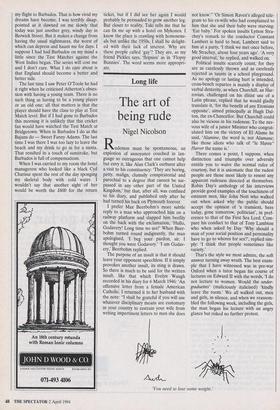Long life
The art of being rude
Nigel Nicolson
Rudeness must be spontaneous, an explosion of annoyance couched in lan- guage so outrageous that one cannot help but envy it, like Alan Clark's outburst after a visit to his constituency: 'They are boring, petty, malign, clumsily conspiratorial and parochial to a degree that cannot be sur- passed in any other part of the United Kingdom,' but that, after all, was confined to his diary, and published only after he had turned his back on Plymouth forever.
I prefer Max Beerbohm's more subtle reply to a man who approached him on a railway platform and slapped him beefily on the back with the exclamation, 'Hullo, Godavery! Long time no see!' When Beer- bohm turned round indignantly, the man apologised, 'I beg your pardon, sir. I thought you were Godavery."I am Godav- ery,' Beerbohm replied. The purpose of an insult is that it should leave your opponent speechless. If it simply provokes another insult, its sting is drawn. So there is much to be said for the written insult, like that which Evelyn Waugh recorded in his diary for 6 March 1946: 'An offensive letter from a female American Catholic. I returned it to her husband with the note: "I shall be grateful if you will use whatever disciplinary means are customary in your country to restrain your wife from writing impertinent letters to men she does not know." 'Or Simon Raven's alleged tele- gram to his ex-wife who had complained to him that she and their baby were starving: 'Eat baby.' For spoken insults Lytton Stra- chey's remark to the conductor Constant Lambert is hard to beat, Lambert said to him at a party, 'I think we met once before, Mr Strachey, about four years ago'. 'A very good interval,' he replied, and walked on.
Political insults scarcely count, for they are as carelessly thrown and as carelessly rejected as taunts in a school playground. As no apology or lasting hurt is intended, cross-bench repartee is mainly a display of verbal dexterity, as when Churchill, an Har- rovian, challenged on his elitist use of a Latin phrase, replied that he would gladly translate it, 'for the benefit of any Etonians opposite', aimed principally at Hugh Dal- ton, the ex-Chancellor. But Churchill could also be vicious in his rudeness. To the ner- vous wife of a junior Minister who congrat- ulated him on the victory of El Alame he said, Alatnine, the word is, not Alamane; like those idiots who talk of "le Havre" Harver the name is.'
There comes a point, I suppose, when distinction and triumphs over adversity entitle you to waive the normal rules of courtesy, but it is axiomatic that the rudest people are those most likely to resent any apparent rudeness directed at themselves. Robin Day's anthology of his interviews provide good examples of the touchiness of eminent men, like John Nott who walked out when asked why the public should accept the opinion of 'a transient, here today, gone tomorrow, politician', in pref- erence to that of the First Sea Lord. Com- pare his conduct to that of Tony Lambton who when asked by Day 'Why should a man of your social position and personality have to go to whores for sex?', replied sim- ply: 'I think that people sometimes like variety.'
That's the style we most admire, the soft answer turning away wrath. The best exam- ple that I have witnessed was in pre-war Oxford when a tutor began his course of lectures on Edward II with the words, 'I do not lecture to women. Would the under- graduates' (maliciously italicised) 'kindly leave the room.' We all walked out, men and girls, in silence, and when we reassem- bled the following week, including the girls, the man began his lecture with an angry glance but risked no further protest.
'You need to lose some weight.'


























































 Previous page
Previous page